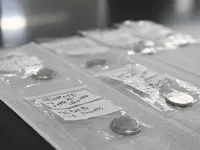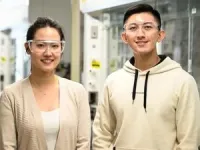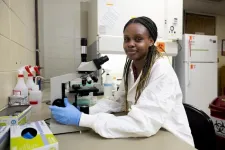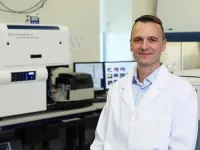(Press-News.org) UNIVERSITY PARK, Pa. — Rechargeable solid-state lithium batteries are an emerging technology that could someday power cell phones and laptops for days with a single charge. Offering significantly enhanced energy density, they are a safer alternative to the flammable lithium-ion batteries currently used in consumer electronics — but they are not environmentally friendly. Current recycling methods focus on the limited recovery of metals contained within the cathodes, while everything else goes to waste.
A team of Penn State researchers may have solved this issue. Led by Enrique Gomez, interim associate dean for equity and inclusion and professor of chemical engineering in the Penn State College of Engineering, the team reconfigured the design of these solid-state lithium batteries so that all their components can be easily recycled. They published their findings in ACS Energy Letters.
“As the need for rechargeable batteries grows, we need to think about the end-of-life of this technology,” Gomez said. “We hope our work highlights the possibilities in recycling of solid-state batteries, with the help of some key design elements.”
Traditionally, most of the core battery components have gone to waste because they mix during the recycling process, forming a “black mass,” according to the researchers. This black mass is rich in materials needed for batteries but separating them out remains a challenge. In solid-state batteries, the use of solid electrolytes compounds this problem, as they become intermixed with the black mass.
To more easily separate these components from the other metal components in a coin cell battery, researchers inserted two polymer layers at the interfaces between the electrode and the electrolyte prior to the start of the recycling process.
“We proposed that by dissolving the polymer layer during the recycling process, you can easily separate the electrode from the electrolyte,” said Yi-Chen Lan, doctoral student in chemical engineering and first author on the paper. “Without the polymer layer separating them, you would have the electrode and electrolyte mixed together, which makes them hard to recycle.”
Once the researchers successfully separated out the components, they made a composite with the recovered metals and electrodes using cold sintering — the process of combining powder-based materials into dense forms at low temperatures through applied pressure using solvents. Cold sintering was developed in 2016 by a team of researchers led by Clive Randall, director of Penn State’s Materials Research Institute and distinguished professor of materials science and engineering. Gomez and his team recently demonstrated the recycling of solid-state electrolytes using cold sintering.
“We used cold sintering to combine the recovered electrodes with recovered composite solid electrolyte powders, then reconstructed the battery with the polymer layers added,” said Po-Hao Lai, a doctoral student in chemical engineering and co-author on the paper. “This enables us to recycle the whole battery, which we are then able to recycle again after its use.”
After testing its performance, they found that the reconstructed battery achieved between 92.5% and 93.8% of its original discharge capacity.
“While the commercialization of all-solid-state lithium batteries is still in its early stages, our work provides important insights and ideas for designing recyclable versions of these batteries,” Lan said. “While we're not quite there yet, the long-term goal is to apply this innovation to larger batteries that could be used in devices like cell phones and laptops, once all-solid-state technology becomes more prevalent.”
In addition to Gomez, Lan and Lai, Bryan Vogt, professor of chemical engineering, also contributed to the paper.
The U.S. National Science Foundation, the U.S. Department of Defense, the Army Research Laboratory and the Army Research Office supported this research.
END
Making rechargeable batteries more sustainable with fully recyclable components
2024-07-15
ELSE PRESS RELEASES FROM THIS DATE:
Biodegradable electronics may advance with ability to control dissolve rate
2024-07-15
UNIVERSITY PARK, Pa. — Biodegradable electronics allow for medical devices — such as drug delivery systems, pacemakers or neural implants — to safely degrade into materials that are absorbed by the body after they are no longer needed. But if the water-soluble devices degrade too quickly, they cannot accomplish their purpose. Now, researchers have developed the ability to control the dissolve rate of these biodegradable electronics by experimenting with dissolvable elements, like inorganic fillers and polymers, that encapsulate the device.
The team, led by Huanyu “Larry” Cheng, the James L. Henderson, Jr. Memorial Associate Professor ...
Most Salmonella illnesses from chicken caused by few products with high levels of virulent strains
2024-07-15
URBANA, Ill. – Raw poultry is one of the main causes of Salmonella poisoning, which affects thousands of people in the U.S. every year. A new study from the University of Illinois Urbana-Champaign shows that few products with high levels of very virulent Salmonella strains are responsible for most of the illnesses from raw chicken parts. The researchers suggest regulation efforts should focus on detecting and preventing those types of high-risk contamination.
“Over the last 20 years, the poultry industry has done a really good job of lowering the frequency of Salmonella in poultry. However, the number of people ...
Kenyan crop contamination outbreak inspires grad student to improve rice storage
2024-07-15
By Maddie Johnson
University of Arkansas System Division of Agriculture
Arkansas Agricultural Experiment Station
FAYETTEVILLE, Ark. — While half the global population relies on rice as a staple, about 15 percent of rice produced each year is contaminated by potentially fatal aflatoxins. Seeing this threaten lives in her home country of Kenya prompted a graduate research assistant to focus on eradicating the risk through safer storage methods.
Faith Ouma, a Ph.D. student in the food science department at the University of Arkansas, was the lead author of “Investigating safe storage conditions to mitigate aflatoxin contamination in rice.” It was published ...
Survey finds women in their 40s may choose to delay mammography when informed about the benefits and harms
2024-07-15
Embargoed for release until 5:00 p.m. ET on Monday 15 July 2024
Annals of Internal Medicine Tip Sheet
@Annalsofim
Below please find summaries of new articles that will be published in the next issue of Annals of Internal Medicine. The summaries are not intended to substitute for the full articles as a source of information. This information is under strict embargo and by taking it into possession, media representatives are committing to the terms of the embargo not only on their own behalf, but also on behalf of the organization they represent.
----------------------------
1. ...
CDI scientists ID ‘unconventional’ new pathway for TB vaccines
2024-07-15
An “unconventional” immune response now identified by scientists from the Hackensack Meridian Center for Discovery and Innovation (CDI) is a potential new pathway for developing new vaccines for tuberculosis (TB), according to a new publication.
Marginal zone B (MZB) cells are a natural response to TB infection which has been long overlooked - and which might be a welcome new target that could be bolstered through new vaccines to better combat and prevent the disease, according to the new publication in the journal Cell Reports.
“Our results indicate that B cells skew their immune landscape ...
Mendoza, Weiss receive $2.6 million grant to study biomechanics of lung tumors
2024-07-15
Michelle Mendoza, PhD, researcher at Huntsman Cancer Institute and associate professor of oncological sciences at the University of Utah (the U) and Jeffrey Weiss, PhD, professor of biomedical engineering and faculty member in the Scientific Computing and Imaging Institute at the U, are the recipients of a $2.6 million grant from the National Institutes of Health (NIH) to research how tension in lung tissue affects the growth and distribution of tumors. This innovative approach could uncover new mechanisms for understanding how lung cancer develops.
“There ...
Study shows how narcissistic CEOs influence the board of directors to take more risk
2024-07-15
Narcissistic CEOs that also serve as chair of the board are adept at controlling how their boards of directors focus their attention, giving the CEO the ability to get their way. A new study published in the Strategic Management Journal found that by driving board discussions about risk-taking to hold a positive tone, narcissistic CEOs can allocate more resources toward risk-taking strategies. The findings deepen our understanding of how CEO behavior and personality types can drive risk management strategies.
The research team — Christopher S. Tuggle of the University of Central Arkansas, Cameron J. Borgholthaus of the University of Wyoming, Peter D. Harms of the University of Alabama, ...
Study shows timely transition from pediatric to adult care is critical for young adults with sickle cell disease
2024-07-15
Sickle cell disease is the most common inherited red blood cell disorder in the United States and can lead to health problems including organ dysfunction, acute chest syndrome and strokes over a patient’s lifespan. According to a new study, individuals living with sickle cell disease who experience a delay of more than six months after transferring from pediatric to adult care are twice as likely to be hospitalized compared to those who transition in less than two months.
In the study, Kristen ...
University of Cincinnati study: Long-term stroke survival improving, but racial disparities remain
2024-07-15
Overall rates of long-term survival following stroke are improving, but Black individuals experience worse long-term outcomes compared to white individuals, according to University of Cincinnati research published online July 15 in Neurology®, the medical journal of the American Academy of Neurology.
UC’s David Robinson, MD, corresponding author on the research, said prior studies had examined short-term stroke outcomes of 30 or 60 days, but this time the team looked at survival rates five years past a person’s stroke.
“This was ...
National Institutes of Health grant could mean progress toward improved outcomes for stroke patients
2024-07-15
The Associate Dean of Research at the University of Tennessee Health Science Center’s College of Nursing has received a two-year, $421,188 grant from the National Institutes of Health (NIH) to improve cognitive screening in people who suffer from a devastating type of stroke called aneurysmal subarachnoid hemorrhage (aSAH).
Professor Ansley Stanfill, PhD, RN, FAAN, has devoted her program of research to improving outcomes for people who survive strokes. Her latest grant aims to determine if an existing screening tool can be used in a new way to assess patients following aSAH and trigger a ...







